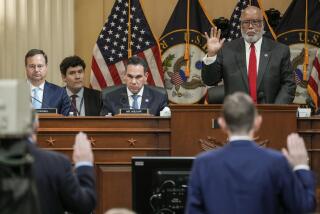‘Revolving Door’ of Corruption : New Evidence Expected at Defense Kickbacks Hearing
- Share via
WASHINGTON — A Senate subcommittee investigating kickbacks in the defense industry will hear significant new evidence Wednesday that corrupt purchasing agents at major defense contractors have migrated from company to company with impunity, each time setting up new bribery schemes.
The hearing comes as the U.S. attorney’s office in Los Angeles is preparing to indict more than a dozen purchasing agents from a broad cross-section of Southern California aerospace firms for taking kickbacks, knowledgeable sources here said Monday.
The indictments will remove any remaining doubt that kickbacks are a serious problem in the defense industry, one source said, adding that “if you keep having cases, it adds to the proof that it is a widespread problem.”
13 Employees Fired by Garrett
Although details are being closely held, successive rounds of indictments are expected that will involve current or former employees at several firms, including Garrett Corp., which has been a focal point of law enforcement and congressional concern since late last year, when the firm fired 13 employees in a kickbacks investigation.
Meanwhile, sources said it will be disclosed at the second in a series of hearings into the problem of kickbacks that employees of Northrop, TRW and Garrett successfully walked through the so-called revolving door of corruption by moving from company to company before they could be caught.
The hearing will be held by the Senate Governmental Affairs Committee’s subcommittee on oversight of government management.
The committee is understood to have compiled employment histories of about 25 prime defense contractor employees whose personnel files indicate evidence or suspicion of corrupt behavior. And yet, in many instances, the companies involved failed to warn later employers. It is the first time that a substantial number of direct cases of such non-disclosure has been documented.
Often Flee to New Jobs
The “revolving door” is considered one of the most important ways that corruption has spread throughout the industry and entrenched itself in havens safe from prosecution. If defense purchasing agents come under question, they often flee to new jobs before anything can be proved.
“The current system allows a buyer who may be kicked out or allowed to walk out of one company for kickback activity to--the next day--walk into another company and resume the kickback practice without skipping a beat,” one observer said.
For example, congressional investigators have been hot on the trail of one purchasing agent who left Garrett and obtained a new job at Northrop after Garrett had accumulated substantial evidence that the individual had been shaking down small vendors for payoffs in exchange for subcontracts.
Why Garrett never told Northrop of the purchasing agent’s unethical activities is expected to be the target of one line of inquiry at Wednesday’s hearing.
“The failure of the defense contractors to pay careful attention to a buyer’s prior job performance helps perpetuate the subcontractor kickback scandal,” said Sen. William S. Cohen (R-Maine), the subcommittee chairman.
Industry executives have insisted in the past that they are not able to stop the “revolving door” because, under what they interpret as stringent privacy and liability laws, they would be opening themselves up to lawsuits if they passed on potentially damaging information about current or former employees.
Employers Too Timid
But the subcommittee will hear testimony from Theodore J. St. Antoine, professor and former dean at the University of Michigan law school, that the defense industry has gone overboard in its reluctance to provide honest job evaluations.
“American employers have become a little too timid about what they are willing to say about current or former employees,” St. Antoine said Monday in a telephone interview. “Where they have information that affects the competency or integrity of a person, I take the position that industry has been excessively uneasy.”
St. Antoine, who describes himself as a supporter of employee rights, said few legal cases exist to suggest that employers face any liability if they disclose evidence of unethical behavior to future employers, especially if it is done without malice.
He said constraints on such disclosure should be looser as the degree of responsibility and need for integrity in a job increases.
More to Read
Inside the business of entertainment
The Wide Shot brings you news, analysis and insights on everything from streaming wars to production — and what it all means for the future.
You may occasionally receive promotional content from the Los Angeles Times.











